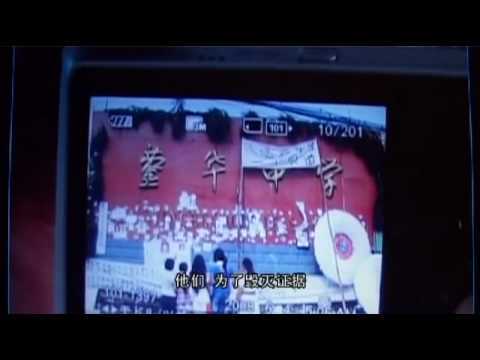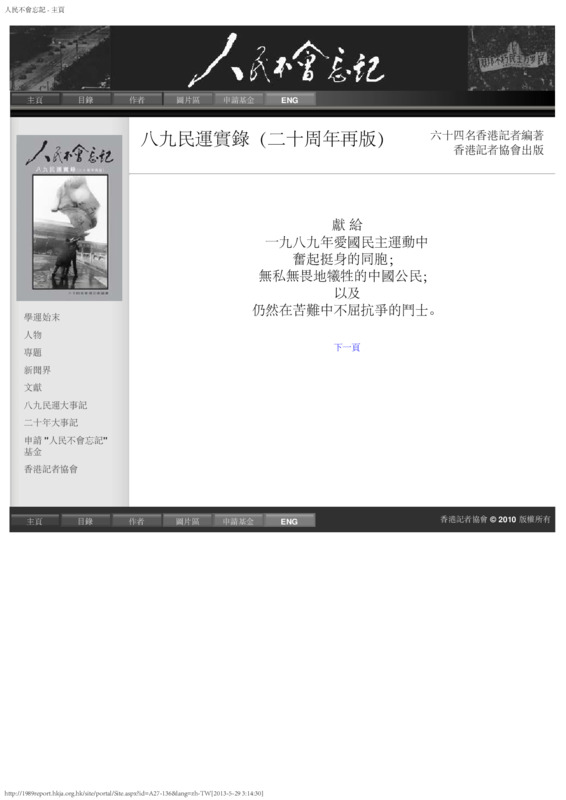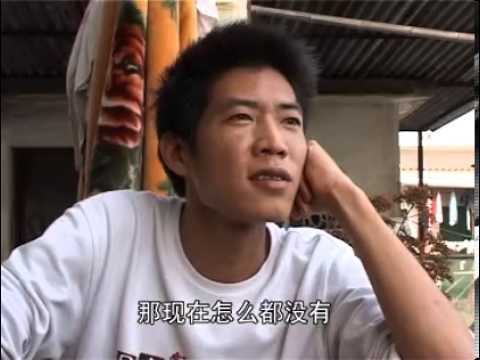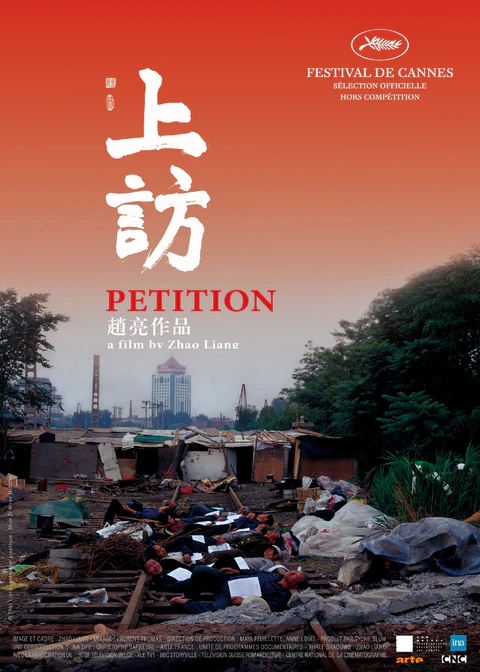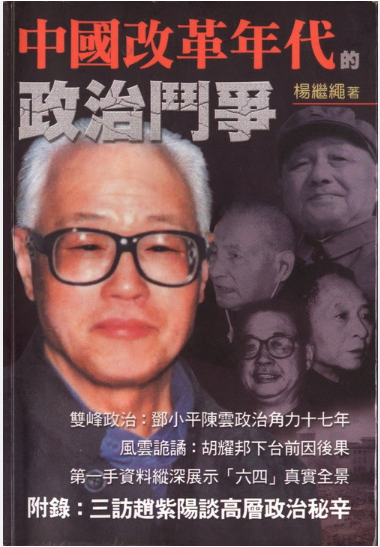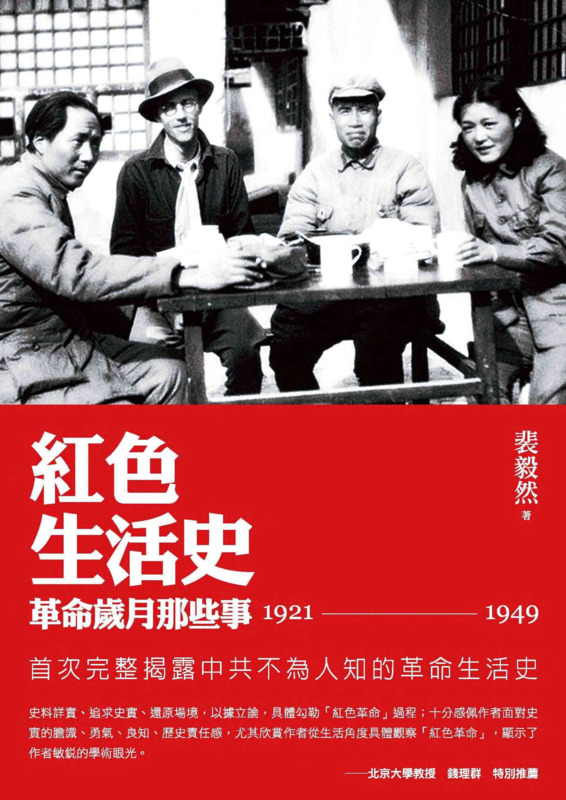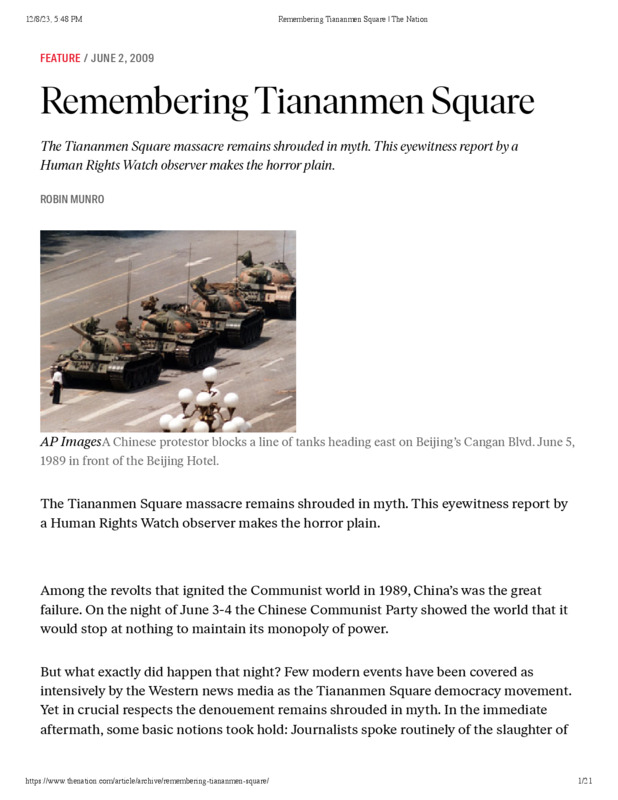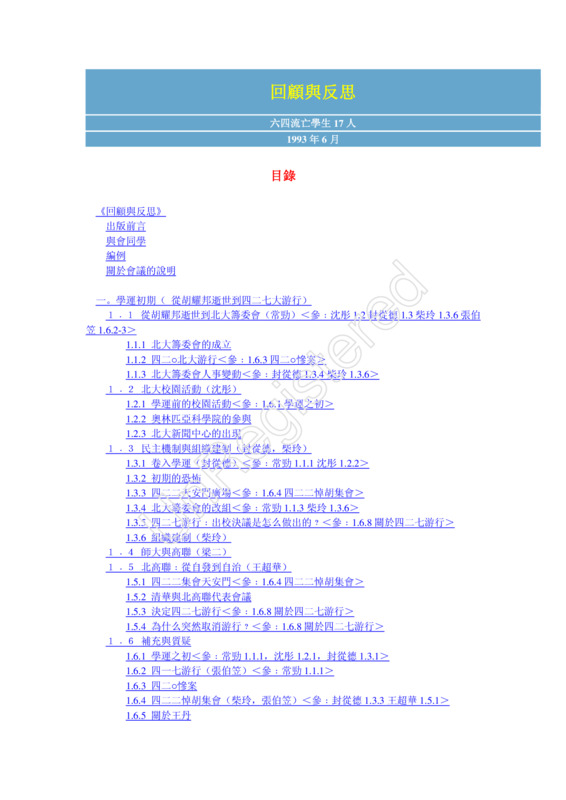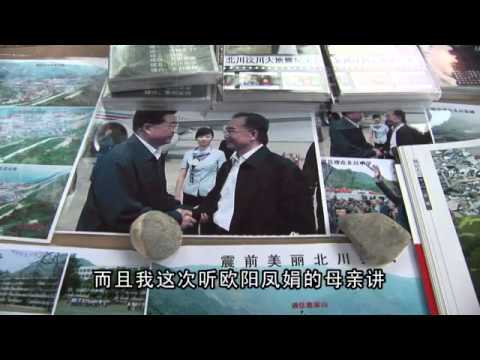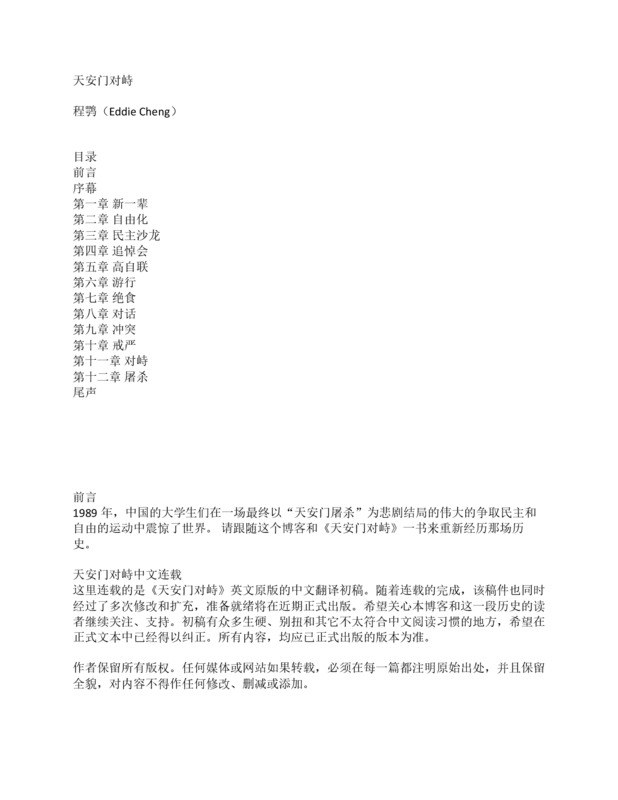Explore the collection
Showing 164 items in the collection
164 items
Film and Video
Our Children
This documentary records the stories of the 2008 Sichuan earthquake. The narrators mainly consist of the parents of students who fell victim to the earthquake, and the film is interspersed with comments from media workers, independent scholars, internet authors, geologists, and environmental protection and legal workers. They expressed their views on the Sichuan earthquake from different perspectives.
This film is in Chinese with Chinese subtitles.
Book
Pastor Wang Yi's Anthology: Carrying the Cross - A History of Chinese Family Churches
Wang Yi, of Chengdu, Sichuan Province, is a well-known Chinese intellectual who later became a pastor. The Early Rain Reformed Church that he led was one of the most famous unregistered churches in China. The church occupied the floor of an office building in Chengdu and had its own bookstore, seminary, and pre-school. It regularly had services of hundreds of people. Later, the church had internal conflicts, while at the same time Wang became more outspoken in his criticism of the government. In 2018, he criticized Xi Jinping for abolishing term limits and allowing himself to become ruler of China for life. Pastor Wang was sentenced to nine years in prison in 2019.
This book is based on the recordings of Pastor Wang's classes at Early Rain in 2018. The first five chapters were reviewed by Pastor Wang himself, but he was arrested before he could complete the review of the last five chapters. The essays cover key issues that concerned Wang, including the role of the church in China as a city on the hill, the role of the Reform church in China, and the history of unregistered churches in China.
Book
People Will Not Forget:A Chronicle by 64 Hong Kong Reporters
This book published by the Hong Kong Journalists Association, summarizes the June 4 reports of dozens of journalists. The first edition was released in July 1989, and was reprinted on the 20th anniversary of June Fourth.
Film and Video
People’s Representative Yao Lifa
Yao Lifa, a teacher from Hubei, was an independent candidate for the 2003 General Election of Deputies to the National People’s Congress. This documentary records the process in which Yao publicized and educated the public on election laws, and his experience with the grassroot electoral campaign. This documentary also reflects the budding grassroot awareness of civil rights in China through voices from the media and ordinary people.
This film is in Chinese with Chinese subtitles.
Film and Video
Petition
The domestically-released version of "Petition" consists of three parts: “The Masses,” “Mother and Daughter” and “Beijing South Railway Station.” Part one, “The Masses,” brings together the stories of petitioners of various backgrounds, who all for different reasons, ended up walking the same path. “The Masses” gives a comprehensive account of what is petitioning and and follows the process.
Part two, "Mother and Daughter," follows the story of Huaying, who brought her daughter Xiaojuan alongside her from the countryside of Jiangsu to Beijing to petition when Xiaojuan was only four years old. Over the next twelve years, they lived a wandering life. "Mother and Daughter" spans the longest period among all the parts of Petition, from 1996 to 2008. It witnesses the growth of Xiaojuan over ten years of petitioning, not only describing the sorrow of Chinese petitioners, but also revealing how long-lasting petitions cases affect the fate of the next generation. In official reports, petitioners lack a voice and appear to be even more marginalized under the media’s tactics. It also raises the issue of forced psychiatric confinement of individuals the Chinese government deems difficult.
“Beijing South Railway Station" surveys the "petitioner village," a residential area near the station that was once home to tens of thousands of people from all over the country. It was eventually demolished by authorities in preparation for the 2008 Olympics. The film captures bungalows being knocked down, shacks being flattened, and security police chasing after residents, the latter not given the time to grab any necessities.
Zhao Liang recalls dressing like the interceptors when filming interceptors, and dressing like a petitioner while filming petitioners. “I had several outfits, and tried to stay low key, using the smallest cameras possible.” The film went on to win the Halekulani Golden Orchid Award for Best Documentary Film at the 29th Hawaii International Film Festival, and a Humanitarian Award for Documentaries at the 34th Hong Kong Film Awards.
Book
Political Struggles in China's Reform Era
The author of this book, Yang Jisheng, is a veteran journalist with 35 years of experience in journalism at Xinhua News Agency, China's official news organization. He knows a great deal about the ups and downs of Chinese politics after the end of the Cultural Revolution as well as the intricate power struggles at the top and has a lot of first-hand information. He personally interviewed Zhao Ziyang, Zhu Houze, Li Rui, Ren Zhongyi, An Zhiwen, Tian Jiyun, and other important people. “Political Struggles in China's Reform Era”, first published in Hong Kong in November 2004, was the subject of a series of crackdowns by the authorities against Yang Jisheng. It was republished in 2010 by Hong Kong's Cosmo Books.
Article
Poppies under the Red Sun: The Opium Trade and the Yan'an Model
In the 1990s, history scholar Chen Yongfa made a fundamental study of the opium economy two decades before the founding of the CCP and completed a monograph, "Poppies under the Red Sun: The Opium Trade and the Yan'an Model". Since then, more and more research articles have been written on the subject, and new information has appeared. Subsequently, the phenomenon of the opium economy of the CCP's Yan'an regime has also became an important field of study.
Film and Video
Postcard
After retiring from her job as a cadre, Wang Lihong fulfilled what she saw as her civic responsibility to become more active in women’s rights in China, especially the protection of their legal rights. In 2009-2010, she became involved in the “Fujian Netizen Case,” which resulted in the arrest of three human rights activists, who all sought to investigate the death of a 25-year-old women believed to have been murdered in a gang rape by men associated with the local police. Wang Lihong wrote letters to the General Secretary of the Fujian Provincial Committee of the Communist Party of China every day for nine consecutive days, calling on the authorities to let them go home for the New Year. For this reason, she was criminally detained by the authorities in March 2011 on suspicion of "picking quarrels and provoking trouble." The case was heard by the Beijing, Chaoyang District People's Court on August 12; nearly a month later, on September 9, the court issued a guilty verdict and sentenced Wang Lihong to nine months in prison. The film documents her case, and raises questions about the accountability of the local government and police. Another one of Ai Xiaoming’s films, “Let the Sunshine Reach the Earth,” documents Wang Lihong’s trial process in more detail.
This film is in Chinese with Chinese subtitles.
Book
Prisoner of the State: The Secret Journal of Premier Zhao Ziyang
“The Course of Reform”, a memoir by Zhao Ziyang, former General Secretary of the Central Committee of the Communist Party of China, was published on May 29, 2009 by New Century Press in Hong Kong. Its English translation, “Prisoner of the State: The Secret Journal of Premier Zhao Ziyang” was published on May 13 before that. According to the book's preface, in 1992, Du Guanzheng, an old subordinate of Zhao Ziyang and former director of the State Press and Publication Administration, together with Xiao Hongda, another former high-ranking CCP official, persuaded Zhao Ziyang, who was under house arrest, to organize his experiences into a book.
Purchase link: https://www.kobo.com/hk/zh/ebook/ZoerWPfG8TiqoXIYwvW2iw.
Film and Video
Ram
The documentary "Ram" was filmed by independent director Tiger Temple in 2016 and is available here in a revised version by the author in 2021. The film documents a real-life incident that took place in Xi'an during the "1983 crackdown". The encounter of the artist Gong Yang (real name Li Xiaoming), the main character of the documentary, is quite representative. It reflects the cruelty and absurdity of the "1983 Crackdown" political campaign launched under the direction of Deng Xiaoping.
Book
Red Life History - The Revolutionary Years (1921-1949)
Professor Pei Yiran's book is the first complete revelation of the untold revolutionary history of the CCP. The book covers many important points in the history of the CCP, including the use of Soviet rubles to build the party, the landlords fundraising campaign, and the love life of Mao Zedong and Jiang Qing, among subjects.
Book
Remembering Tiananmen Square
The author was a Hong Kong-based observer for the international human rights organization Human Rights Watch. Remembering Tiananmen is a long article first published in The Nationmagazine in November 1990. It was written after witnessing the crackdown around the square during the night of June 3 until 4 a.m. the next morning.
Book
Rethinking China's Democracy Movement
Author Hu Ping was involved in the Xidan Democracy Wall movement in the late 1970s and now lives in the United States.
He has successively chaired the pro-democracy publications <i>China Spring</i> and <i>Beijing Spring</i>. This book, published in 1992, analyzes the reasons for the failure of the June Fourth Movement and summarizes the lessons learned. The last two chapters suggest how to continue the pro-democracy movement in the future.
Book
Retrospect and Reflection - 17 Students in Exile on June 4
From July 17 to 24, 1991, seventeen student leaders who had participated in and led the 1989 student movement and later went into exile held a "Seminar on Historical Review and Reflection on the 1989 Student Movement" in Paris, France, to review and reflect on this great democracy movement in modern Chinese history. This book is organized according to the audio recordings of the speeches made at the seminar. It covers the following topics: the Peking University School Society Fever in 1988; the establishment of the Peking University Preparatory Committee; the founding of the Peking University Higher Education Union; the initiation of the hunger strike; the founding of the Hunger Strike Group; the founding of the Dialogue Group; the imposition of martial law; the founding of the Commanding Office of the Defense of Tiananmen Square; the founding of the Joint Meeting of the Capital; the establishment of martial law; the establishment of the Tiananmen Square Defense Command; the establishment of the Joint Meeting of Various Sectors in the Capital; the retreat from Tiananmen Square; the overseas student movement, etc. It includes rare historical material.
Film and Video
River of Oblivion
In this film, the filmmaker accompanied volunteer Xie Yihui as she visited the parents of students who died in the 2008 Sichuan earthquake to find people with knowledge of the architectural blueprint of the Beichuan Middle School. This documentary presents the rise of earthquake tourism and records the mindset of volunteers, bereaved parents, and tourists at the anniversary of the earthquake. This film is interspersed with historical film materials of Beichuan Middle School’s building samples taken by parents in 2008, as well as architect Zhu Tao’s analysis of the construction drawings and building quality. It also shows the perceptions of mothers, teachers, and photographers.
This series of films are in Chinese with Chinese subtitles.
Book
Science, Democracy, Rationality: Xu Liangying's Anthology
Chinese intellectual Xu Liangying is a scholar of the history of scientific thought and an active warrior in defense of human rights. He weathered China's most extreme political storms and began to speak out again after China opened up slightly in 1977. This book collects his political speeches between 1977-1999. Originally published by Spiegel Publishing in Hong Kong in 2001, the book was later made into a PDF version by Xu Liangying's family in the hope that it would be circulated online to a wider audience.
Book
Seventy Years of the Chinese Communist Revolution
Professor Chen Yongfa's book examines the history of the Chinese Communist Party from the perspective of modern Chinese history. It divides it into three stages: revolutionary seizure of power, continuous revolution, and farewell revolution. It delves into three major issues in CCP history: nationalism, grassroots power structure, and ideological transformation and control. published by Taiwan's Linking Publishing in 2001.
Book
Sky Burial: The Fate of Tibet
In this book, author Wang Lixiong presents his arguments with a great deal of personal experience and field work. The book covers the history of the Tibetan issue, the current situation, and various aspects. The book was first published by Mirror Books in Hong Kong in 1998, and an updated edition was released in 2009.
Film and Video
South Side Street
South side Street near Tiananmen Square in Beijing has long been a gathering place for some homeless people as well as petitioners. The director became involved in the homeless relief charity in 2007, and continued to follow the film, which the director finished editing eight years later. The film was selected for the 12th China Independent Film Festival Documentary Competition.
Book
Stand off at Tiananmen
This book goes beyond the individual perspective of a memoir to recount the movement from the perspective of the student collective. It focuses on the vivid portrayal of characters and their interactions. As the author puts it, this is the first time that the 1989 pro-democracy movement and the June 4 tragedy are "recounted as a complete and coherent attempt at narrative history." This book was originally written in English and published in 2009 on the 20th anniversary of June Fourth. The author himself later translated it into Chinese and released it on the eve of June 4 this year. The author, Eddie Cheng, was originally a student in the Physics Department of Peking University in the class of '80. He caught up with the election campaign right after he entered the school. Later, he became an important organizer of the student movement, having spearheaded the two campus pro-democracy campaigns of '84 and '85. In 1986, he went to the United States to study abroad. Currently he resides in the US state of Colorado.
The book can be purchased <a href="https://www.amazon.com/dp/0982320302">here</a>.
